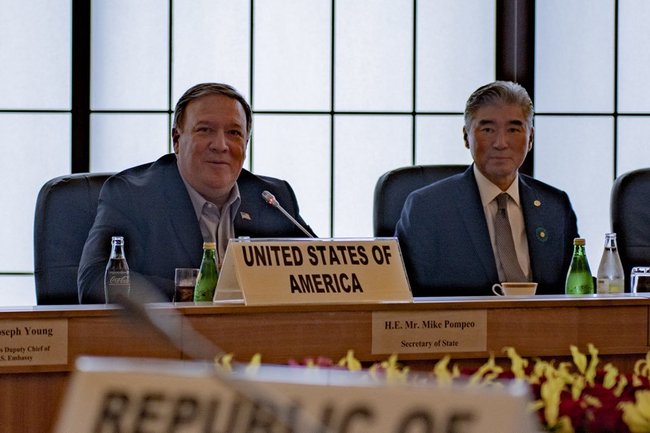 |
|
Secretary of State Mike Pompeo during his meeting with the foreign ministers of South Korea and Japan on July 8 in Tokyo. (Pompeo Twitter account)
|
US Secretary of State says US agrees with principle of “phased and synchronous action”
Just one day after the conclusion of high-level North Korea-US talks, US Secretary of State Mike Pompeo reaffirmed the American commitment to improve relations with North Korea as compensation for its denuclearization while mentioning the Vietnamese “miracle.” Pompeo effectively also confirmed that North Korea and the US are in agreement on the principle of “simultaneous action” in regard to the sequence of denuclearization and rewards by the US. “If you’ll seize the moment [. . .] the miracle [of Vietnam] could be yours,” Pompeo said while visiting Hanoi, Vietnam, on July 8, addressing North Korean leader Kim Jong-un. “In light of the once-unimaginable prosperity and partnership we have with Vietnam today, I have a message for Chairman Kim Jong-un: President Trump believes your country can replicate this path.” Pompeo placed particular emphasis on the importance of recovering and repatriating the remains of US POW/MIA, citing the example of Vietnam: “One key to Vietnam’s enormous rise over the past few decades was a new engagement [dialogue and exchange] with the United States of America. This began when [. . .] the United States and Vietnam began working together to repatriate the remains of American service members lost in Vietnam.” Pompeo essentially acknowledged that the US agrees with the principle of “phased and synchronous” action during the press conference that was held following his meeting with the foreign ministers of South Korea and Japan in Tokyo on the same day. “There were three parts of the agreement in the Singapore summit. There were the establishment of peaceful relations between the countries, increased security assurances to North Korea and its people, and finally, denuclearization. Each of those needs to be conducted in parallel,” Pompeo said. “There will be things that take place along the way that help achieve the security assurances that the North Koreans need and improvement in the peaceful relations between our two countries during the time that denuclearization is taking place.” These remarks are interpreted as meaning that security assurances and relational improvements can take place according to the principle of “action for action” even while denuclearization is underway. North Korea’s-state-run Korean Central News Agency (KCNA) reported on June 13, the day after the summit in Singapore, that the two leaders “had been in agreement about the importance of abiding by the principle of phased and synchronous action,” but the Trump administration essentially denied this. It is in this context that Pompeo’s remarks are atypical. One possible interpretation is that, after North Korea complained in a Foreign Ministry statement on the evening of July 7 that the US had “just trotted out unilateral and gangster-like demands for denuclearization” that went against the spirit of the Singapore summit, the US basically confirmed the content of the North Korea-US agreement. But Pompeo also said that “the economic sanctions are a different kettle of fish altogether [from simultaneous action]. [. . .] The enforcement of those sanctions will continue until denuclearization is complete.” In other words, the US intends to reserve the easing or lifting of sanctions for use as leverage in the negotiations. By Yi Yong-in, Washington correspondent Please direct comments or questions to [english@hani.co.kr]






